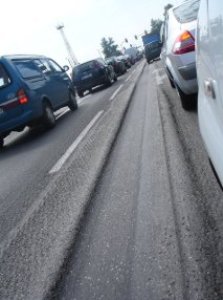In a paper titled ‘Nanoclay-Modified Asphalt Materials: Preparation and Characterization,’ Zhanping You, an Associate Professor at Michigan Technological University, has reviewed the effect of nanomaterials in the preparation and characterization of asphalt.
 Ruts like these pose a serious threat to motorists. Zhanping You and his team have discovered that adding nanoclay to the asphalt pavement mix may help roads resist rutting.
Ruts like these pose a serious threat to motorists. Zhanping You and his team have discovered that adding nanoclay to the asphalt pavement mix may help roads resist rutting.
The paper also discusses new inventions of You's group that demonstrate that nanoclay-modified asphalt materials can be used to build safer and longer-lasting roadways. These new asphalt blends are capable of preventing potholes, rutting and cracks.
Asphalt pavements made of asphalt and aggregates such as gravel are subjected to rutting, potholes and cracks due to cold, heat and heavy traffic. Ruts occur usually on busy roads, and areas with slow traffic, stoplights and stop signs.
You informed that rutting can be unsafe, particularly in ice and snow. Hence, reducing rutting through the use of advanced materials will be advantageous to the public. You's group analyzed two kinds of nanoclays by adding 2% to 4% by weight of them to the asphalt. Even this trace amount of addition, which represents below 0.5% of the asphalt pavement’s overall weight, made a significant difference.
According to You, the addition of nanoclays significantly enhanced the viscosity, meaning that the new asphalt blend will have better stiffness and will not distort much under heavy traffic or in hot weather. Since the testing is going on, the research team is not able to confirm whether the nanoclay-modified asphalt can resist cracking under heavy loads or in cold weather. However, the objective of the team is to design new asphalt blends with those qualities.
You’s team is also testing the effect of other nanomaterials such as nano-composites and nano-silica in the durability of asphalt.